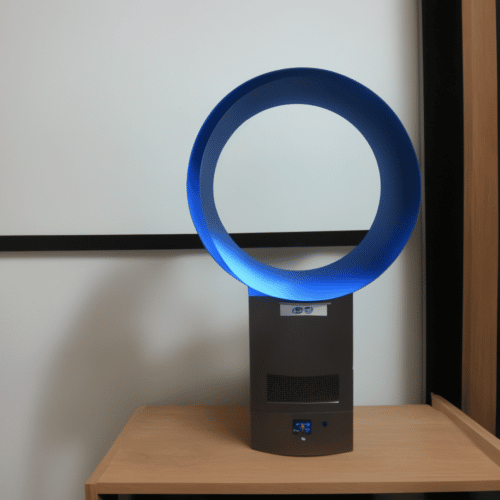Last Updated on
Are you considering getting a bladeless fan for your home? You may be wondering, do bladeless fans make noise? Or are they worth it in the end? Bladeless fans have become increasingly popular due to their modern design and energy-saving features. But before you invest in one, it’s important to understand if these devices actually produce sound or not. In this blog post, we will take a look at whether or not bladeless fans make noise, how to reduce any potential noises that come from them and ultimately help you decide if they’re worth investing in. So keep reading to find out more!
Table of Contents:
- Do Bladeless Fans Make Noise?
- How to Reduce Noise From Bladeless Fans
- Are Bladeless Fans Worth It?
- FAQs in Relation to Do Bladeless Fans Make Noise
- Conclusion
Do Bladeless Fans Make Noise?
Do bladeless fans make noise? This is a question that many people ask when considering purchasing a fan for their home. The answer is yes, but the level of noise depends on the type and model of fan you choose.
Traditional Fans:
Traditional fans have blades that spin around to create airflow in your room. As these blades move, they can create quite a bit of noise depending on the speed setting and size of the fan. Some traditional fans are designed to be quieter than others, but it’s important to note that even those models will still produce some sound.
Bladeless Fans:

Bladeless fans work differently from traditional ones as they use air pressure instead of spinning blades to generate airflow in your space. Because there are no moving parts involved with this type of fan, they tend to be much quieter than their blade-based counterparts. However, it’s important to remember that even bladeless fans will still produce some amount of sound since air needs to be pushed through them for them to function properly.
The exact amount of noise produced by each type and model varies significantly, however, most bladeless fans generally operate at lower decibel levels in comparison to traditional models. This is due to the lack of moving parts which helps reduce vibration-related sounds considerably. Furthermore, some newer models are equipped with built-in sound-dampening technology that further reduces any potential noises generated from either the device itself or external sources such as wind gusts or nearby traffic etc.
Ultimately, it’s clear that bladeless fans can make some noise but with the right care and maintenance, this noise can be reduced. Now let’s explore how to reduce the noise from bladeless fans in our next section.
How to Reduce Noise From Bladeless Fans
If you’ve ever been in a room with a bladeless fan, you know that they can be quite noisy. But don’t worry – there are some easy ways to reduce the noise from your bladeless fan and make it more enjoyable to use.
The first step is to adjust the speed settings on your fan. Most bladeless fans have multiple speed settings, so try turning it down or up until you find one that works for you. This will help reduce the amount of noise coming from the fan itself.
Another way to reduce noise from your bladeless fan is by using soundproofing materials such as acoustic foam panels or curtains around the area where the fan is located. These materials absorb sound waves and keep them from bouncing off walls and other surfaces, thus reducing overall noise levels in the room.
You can also invest in an air purifier if you want to further reduce noise levels in your home or office space. Air purifiers work by filtering out airborne particles like dust, pollen, pet dander, mould spores, smoke particles and other allergens which can cause allergies and asthma symptoms as well as contribute to increased background noises when present in large quantities within a given environment. By removing these contaminants from circulation through filtration processes, air purifiers effectively improve indoor air quality while simultaneously reducing ambient sounds within any given space.
Finally, another great way to minimize background noises associated with operating a bladeless fan is by placing it away from direct contact with walls or furniture pieces. When placed too close, vibrations created by motorized components within most models tend to reverberate throughout any given area resulting in increased decibel readings. To avoid this issue altogether, simply place at least two feet away from all nearby objects including but not limited to: tables, chairs, bookshelves etc.
By making sure to choose the right size and type of bladeless fan for your needs, as well as ensuring proper maintenance, you can significantly reduce noise levels. But are these fans worth it? Read on to find out.
Are Bladeless Fans Worth It?
When it comes to home and garden products, bladeless fans are becoming increasingly popular. But what exactly are they, and more importantly – are they worth the investment?
Bladeless fans work by using a combination of airfoil technology and an oscillating base to create a powerful stream of air. This allows them to move more air than traditional fan blades while producing less noise in the process. In addition, many models come with remote controls for easy operation from across the room.
The main benefit of bladeless fans is that they provide a much quieter cooling experience compared to traditional fan blades. This makes them ideal for bedrooms or other areas where noise can be disruptive or annoying. They also tend to look sleeker than their blade-based counterparts, making them perfect for modern homes or offices with minimalistic decor styles.
On the downside, however, bladeless fans tend to cost significantly more than regular ones – often up to twice as much. Additionally, some users have reported that these devices don’t always cool as effectively as their blade-based counterparts due to their lack of direct airflow control (although this isn’t necessarily true for all models).
So when it comes down to it – are bladeless fans worth it? Ultimately this depends on your needs and budget; if you want something quiet but don’t mind paying extra then these could be just what you need. However, if the price is an issue then perhaps consider looking at some cheaper alternatives first before taking the plunge into buying one of these fancy gadgets.
FAQs in Relation to Do Bladeless Fans Make Noise
Why are bladeless fans quieter?
Bladeless fans are quieter than traditional fans because they use a different type of technology. Instead of blades, bladeless fans rely on an oscillating tube that creates a powerful stream of air to circulate the room. This design eliminates the turbulence and noise associated with fan blades, resulting in a much quieter operation. Additionally, since there is no blade to catch dust or dirt particles, these fans require less maintenance and stay cleaner for longer periods of time. With their quiet operation and low-maintenance requirements, bladeless fans offer a great solution for those looking for an efficient way to cool down their home without having to worry about loud noises or frequent cleaning.
How loud is the Dyson bladeless fan?
The Dyson bladeless fan is known for its quiet operation. It has been tested to generate sound levels of between 40 and 56 decibels, which is equivalent to a low conversation or noise level in a library. This makes it one of the most silent fans on the market today, allowing you to enjoy cool air without disturbing your peace and quiet.
Conclusion
In conclusion, bladeless fans are a great choice for those looking to reduce noise in their home or garden. While they do make some sound, it is usually minimal and can be further reduced with the right setup. Ultimately, the decision of whether or not to purchase a bladeless fan comes down to personal preference – but if you’re wondering “do bladeless fans make noise?”, then the answer is yes – but only a little bit.
Paul is the type of person who never met a problem he couldn’t fix. He can always be found tinkering with something in his house, even if it isn’t broken! His tips and tricks are often shared on our site. He’s the one you call when something breaks because he has been known to improvise fixes for everything from leaky faucets to malfunctioning dryers.



